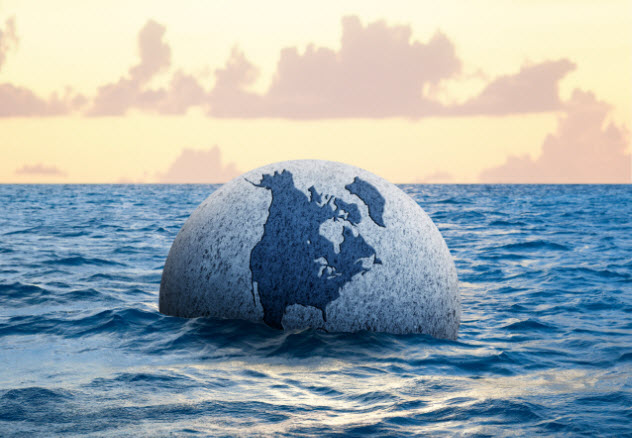 Technology
Technology  Technology
Technology  Weird Stuff
Weird Stuff 10 Wild Facts About Taxidermy That You Probably Didn’t Know
 Travel
Travel 10 Beautiful Travel Destinations (That Will Kill You)
 Miscellaneous
Miscellaneous 10 Modern Marriage Rituals Born from Corporate Branding
 Weird Stuff
Weird Stuff Ten Bizarre Visions of 2026 from Fiction
 Weird Stuff
Weird Stuff The 10 Unluckiest Days from Around the World
 Food
Food 10 Modern Delicacies That Started as Poverty Rations
 Movies and TV
Movies and TV 10 Shared TV Universes You’ve Likely Forgotten About
 Weird Stuff
Weird Stuff 10 of History’s Greatest Pranks & Hoaxes
 Miscellaneous
Miscellaneous 10 LEGO Facts That Will Toy with Your Mind
 Technology
Technology 10 Stopgap Technologies That Became Industry Standards
 Weird Stuff
Weird Stuff 10 Wild Facts About Taxidermy That You Probably Didn’t Know
 Travel
Travel 10 Beautiful Travel Destinations (That Will Kill You)
Who's Behind Listverse?

Jamie Frater
Head Editor
Jamie founded Listverse due to an insatiable desire to share fascinating, obscure, and bizarre facts. He has been a guest speaker on numerous national radio and television stations and is a five time published author.
More About Us Miscellaneous
Miscellaneous 10 Modern Marriage Rituals Born from Corporate Branding
 Weird Stuff
Weird Stuff Ten Bizarre Visions of 2026 from Fiction
 Weird Stuff
Weird Stuff The 10 Unluckiest Days from Around the World
 Food
Food 10 Modern Delicacies That Started as Poverty Rations
 Movies and TV
Movies and TV 10 Shared TV Universes You’ve Likely Forgotten About
 Weird Stuff
Weird Stuff 10 of History’s Greatest Pranks & Hoaxes
 Miscellaneous
Miscellaneous 10 LEGO Facts That Will Toy with Your Mind
10 Things We Do Today That Will Be Barbaric In The Future
Do you ever look back at the past and realize how stupid and primal our ancestors were? Doctors used to bleed patients to “make them better.” Slavery used to be commonplace. There was a time when toilet paper was unknown and people used their hands (or worse) to wipe. At one point, kings were considered gods that could do no wrong.
Today, we’ve advanced from those earlier times. However, despite how progressive we think we are, there are many things that we continue to do wrong. In 100 years, people will probably look back at us and say: “My goodness, they were a bunch of savages. How the heck did those primitives ever survive being so idiotic?”
As predicted by the author, here are 10 stupid beliefs and systems of modern society that will make future generations think that we’re barbarians.
10 Manual Driving
In the future, nobody will actually drive cars, planes, or probably anything else. True pilots will become a rarity. People in the future will look back at the days when we drove around, running into other people with our cars, and say that we were idiots.
In the US, 40,000 people die from car accidents every year. Cars are virtual death machines, but we have to get places. We have things to do, and many of our jobs require a commute that’s too long to walk or bike.
So it’s safe to say that we’ll always rely on some form of car. However, it’s likely that future people will overcome the fatality of human error by using technology that’s similar to a Google self-driving car.
This pioneering technology has already been tested in the field for over 1 million miles with a surprising amount of success. Only one accident has been recorded that is the fault of a Google car, and it was a minor one.
So it’s not a big leap of logic to presume that this technology will start to dominate transportation in the future and the world of driving will be a safer place.
9 Using Toilets

Throughout the thousands of years of humanity’s existence, we’ve always had one constant—the need to poop. We’ve dealt with this need in a surprising number of ways.
In the old times, we’d take dumps in the forest and wipe with leaves, if at all. Those who were lucky would have a stream nearby to help them get clean. The less fortunate developed diseases from their uncleanliness.
In the days of Rome, there were public restrooms where people would poop into a stream of water and wash their behinds with a cloth. Then the cloth got passed down to the next person.
Recently, we’ve developed toilet paper and wet wipes. Although we like to brag about how clean we are, our toilets and need to wipe will be considered extremely unhygienic in the future. They’ll think of us as a primitive tribe who all defecate in the same hole in the ground.
But if people in the future won’t use toilet paper or toilets, how will future people poop?
It’s a mistake to assume that they’ll even poop in the first place. Due to advances in biological sciences and genetically modified food, it’s entirely possible that our food will be designed to be completely digested and we’ll have no waste to process. Thus, no poop.
Even more likely, future “toilets” will be designed to do the whole process automatically for us. Thus, we’ll have no need to ever touch our own poop again.
8 Labeling Based On Gender

Currently, our society is in an uproar about gender. We have males who want to be female, females who want to be male, and others who aren’t sure that they even want to belong to such archaic categorizations.
We have arguments over which gender gets paid more, which gender is more entitled, and all the other problems that go with labeling people into two camps as though we’re pitted against each other.
In the future, it’s likely that this problem will be a thing of the past. Through gene manipulation and advances in surgery, people will be able to modify their bodies as they see fit. The days of arguing over gender will be no more.
Concepts such as “male” and “female” will become meaningless. That’s not to say that we’ll be sexless, but gender won’t divide us anymore because anyone will be able to become anything—whether that’s a multigendered person or a female turned male.
Consequently, future societies will look back on the days that we showed bias based on sex and call us primitive apes.
7 Governing With A Two-Party System

In the medieval ages, kings and queens ruled different parts of Europe. Now we look back at them and realize how wrong they were for letting unelected officials regulate every aspect of their lives.
Today, we have democracy—a gift from the Romans and the Greeks. Yet, despite all our success with it, we still act like children with our two-party system of Republicans and Democrats.
Whether our recent elected presidents are Republican or Democrat, they always do the same thing: Increase debt, decrease liberties, and lie about anything to sound nice.
Einstein said that insanity is “doing the same thing over and over again and expecting different results.” So why do we continue to elect the same people from the same parties and expect different results—like hoping that the economy will suddenly improve or that the endless wars will suddenly go away?
Doesn’t it stand to reason that we need to elect people who will govern differently if we want a better government? If we continue on this path of division—acting like children who are fighting for team one and team two—how will our government ever improve?
Bottom line, people in the future are going to look at our presidents and system of election and laugh. A lot.
6 Fighting A War On Drugs

In the name of justice, we imprison many people who take illegal drugs. We say that we’re helping society by ridding it of lowlifes. Over 70 percent of America’s current criminals are in prison for nonviolent crimes, and over 50 percent are in for drug-related crimes.
The majority of drug users take one of these four substances: marijuana, cocaine, methamphetamine, and heroin. Marijuana is a little kid’s drug when compared to many drugs that don’t require prescriptions. Anyone who’s used both alcohol and weed can testify to the fact that alcohol is the more dangerous substance. Yet one will land you in prison and the other won’t.
Cocaine is a stimulant that increases energy and alertness—think of an extreme version of coffee. Methamphetamine decreases appetite, induces a feeling of happiness, and increases energy. It’s often used in pharmaceutical drugs for people suffering from obesity. Heroin is often used as a painkiller. Many patients receive it as medical care and don’t become helplessly addicted.
Yet, despite the harmlessness of these four drugs, the possession of these substances can and commonly does ruin thousands of lives because of our harsh laws against them. As we can already tell by the level of sympathy for marijuana and other drug users, the war on drugs will end someday. Nearly every state is projected to legalize marijuana in the near future.
The future society will look back on this day and wonder how we were ever so cruel to people simply because we didn’t understand them. A person should be able to do whatever they want to their own body. It’s basic morality.
5 Poor Health Care

In every way possible, our health-care system is a failure. It is far more expensive than it has to be and harder to get than it should be. People are dying because of it.
This isn’t something new. For the past 20 years, we’ve been harping about health-care reform. The problem is so bad that we don’t even have to be from the future to know it’s a problem.
Barack Obama and others have attempted to fix the system with the Affordable Care Act, but many people are still not rich enough to pay their medical bills. It’s a complicated series of issues that has yet to be resolved.
We don’t know what the health-care system of the future will look like. All we know is that it can’t be worse than it is now. Hopefully, people will look back in 100 years and wonder how we were unable to see the obvious solution right in front of our noses.
4 Factory-Style Education

With a father who was a biology teacher at a public school around the slums of Memphis, a mother who was an English teacher at a private school overseas, a stepdad who was a geography teacher in the public schools of Northwest Arkansas, and grandparents who were both university professors for several decades, I consider myself to be particularly familiar with modern education. In fact, I’ve seen every dark side of it.
The inherent problem with education today is that we haven’t updated the process in nearly 100 years. We still treat children like they are robots being assembled in a factory. We try—and fail—to teach every child the same thing at the same time. It’s as if they are expected to become the same person with the same responsibilities.
But each person learns different things at different rates. Not every person wants or even needs to learn the same things. Forcing every child down the same path to meet the same standards is bound to cause societal and educational problems.
From a biological standpoint, humans are not designed to learn like that. For no good reason, we’ve created a process that works against every human instinct—and it gets poor results.
When education was first becoming standard in the modern world, any education was better than no education. Now that almost every nation on the planet has some sort of standardized education, it is no longer notable to have an assembly-line style of teaching.
We don’t have an educational system that cooperates proactively with the Information Age. We have the great power of the Internet, which has nearly everything possible on it, and yet we fail to use it when teaching kids.
Is it any wonder that kids hate school when we make it so boring and monotonous? In the future, learning will be radically remastered. It won’t be about memorizing factoids or working the same equation 20 times. Instead, it will be about the practical application of skills and analytical thinking.
The children in space academies on Mars will gaze up at the stars and wonder how people ever lived through something as barbaric as public schools.
3 Radical Global Warming Environmentalism

Currently, we use global warming as an excuse for too much destruction. We make it our bad omen, our dark god that we must appease with carbon emission taxes. It’s an easy mistake to make because so few people actually understand the science behind climate change. Those who do are paid to hype how big, bad, and terrible global warming is. It’s nothing personal on their part; it’s just business.
Our problem is that we blame global warming—a problem that can’t be solved by anything except a new power source—when we should be blaming things that we can actually fix to save lives. We should engineer better levees, create better flood warning systems, teach better irrigation techniques, etc.
So let us all come together to save lives in a practical manner instead of trying to appease the climate gods by hurting impoverished countries with the strict regulations that many environmentalists recommend.
If we’d just stop harping about the horrible ways of fossil fuels and instead unite under a common banner of doing actual good, perhaps future people won’t look back and question our brains quite as much.
2 Manual Labor

In ancient times, we built our buildings with old-fashioned manpower. Stones were hauled for miles on our fragile backs, and beasts of burden suffered along with us. Not too long ago, southern plantations used slaves to plant and harvest crops in the cruelty of the sun.
Now we have big machines that do a lot of the work for us: tractors, cranes, semitrucks, and bulldozers. However, there are still many modern jobs that require hours of backbreaking labor from our people.
Lumberjacks, factory workers, and construction workers spend their time sweating as they try their best to do their jobs with the tools available. Through this process, they risk hurting themselves just for a paycheck.
But as our tools improve and robots begin to take over more of our physical jobs, there may come a point when people no longer have to endanger their physical well-being to receive money. Our society will have advanced beyond the dangers of labor, and machines will likely do many—if not all—of the hazardous jobs for us.
1 War

Albert Einstein was a smart man. Most people can agree on this. Many would even call him a genius. He once famously said, “I know not with what weapons World War III will be fought, but World War IV will be fought with sticks and stones.”
Although everyone agrees that the man who said this was smart, his pessimistic view is quite controversial. For a long time, it was said that the world would end with a nuclear war. It hasn’t happened, and we’ve had nuclear capabilities since 1945. Perhaps this means that humans are better than we like to think we are. Perhaps war isn’t a necessity. Perhaps it isn’t inevitable.
At this point, nobody can say for sure if war will ever end. Perhaps humanity isn’t capable of advancing beyond the primitive concept of killing. After all, we will always have disagreements and the only way to solve monumental disagreements is through fighting, right?
Then again, perhaps one day we will overcome the biggest hurdle of them all. Senseless killing will be a thing of the past. If such a day ever comes, people will look back at the countless days of violence and be ashamed of their ancestors.
Nathaniel Sullivan is the author of the fantasy book The Epic of Garthel and other works that he publishes at his website.








